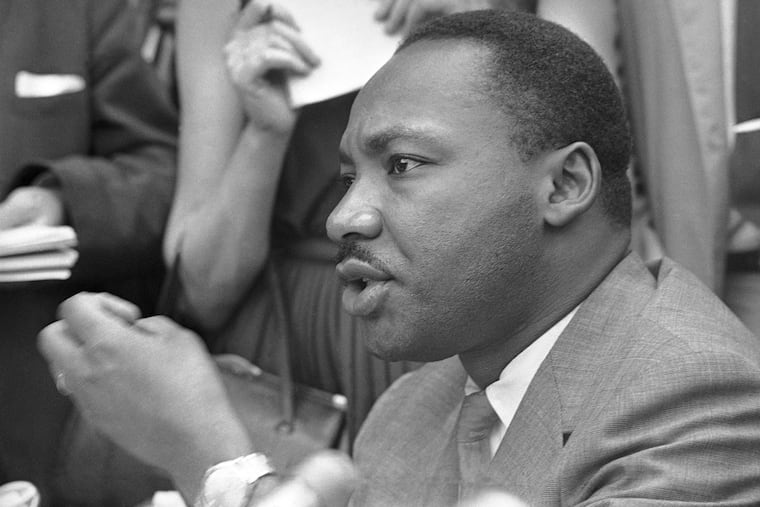Light in dark times: Lessons from Black history and MLK’s life
We are in the grip of deepening darkness, wandering in a wilderness without a moral compass. There is need for places where we can stand together in love and justice.

It is ironic Donald Trump’s inauguration and the Rev. Dr. Martin Luther King Jr.’s birthday were observed on the same day last month.
Trump represents a contemporary Republican Party gone off the deep end. It hasn’t been the “Party of Lincoln” for a while — not after Richard Nixon’s “Southern Strategy,” Ronald Reagan beginning his campaign for the presidency in Philadelphia, Miss. (where three Mississippi Freedom Summer civil rights activists were murdered), or the images of Willie Horton and talk of “welfare queens” in Detroit and Harlem, and perhaps Philadelphia.
But the MAGA version of the Republican Party has put aside “polite” appeals to fear and bias in favor of more blatant, almost theater of the absurd appeals to animus toward groups of people based on skin color, ethnicity, religion, and designation as “other” based on gender, sexuality — or whatever.
King came to the nation’s attention with the Montgomery bus boycott, which began only months after the murder, also in Mississippi, of Emmett Till. The bus boycott was already in the planning stages when the young Boston University doctoral candidate arrived in Montgomery, Ala., as the new pastor of Dexter Avenue Baptist Church. He was not alone. He lent his eloquent voice to a movement in which he was preceded by persons such as Howard Thurman, W.E.B. Du Bois, Paul Robeson, Ida B. Wells, Fredrick Douglass, Harriett Tubman, John Brown, Nat Turner, veterans returning from World War I and II, the Harlem Renaissance, the Quaker abolitionists here in this city … all the way back to the Haitian Revolution.
The post-WWII movement that had its immediate spark with the bus boycott was part of the effort to shine a light for the sake of a country wandering in the midst of a dark, moral wilderness since the Civil War and the collapse of Reconstruction.
The Episcopal bishop of Washington, Mariann Budde, spoke out of this same light in the darkness on the day following the inauguration when, with the 47th president sitting in the front row, she appealed for mercy for those seeking refuge from beyond our country’s borders, and for those who are condemned as “other” because of gender and sexual identity. She also urged love for those who we identify as enemies.
Budde’s courage in her sermon from the National Cathedral reminded me of King’s speech a year to the day before his assassination, and his acknowledgment of the need to break silence and to break with the Johnson administration regarding the war in Vietnam. Again, he was not alone. I am convinced King heard the voices of Malcolm X, Stokely Carmichael, the young people of the Student Nonviolent Coordinating Committee, and many others.
There are lessons we can learn from Black history and King’s life as the chaos of executive disorder abounds, and as the globe faces a crisis of fire, flood, and drought. As yawning wealth inequality increasingly affects everyone. As ethnic cleansing and death reign throughout Palestine and in Gaza, not to mention Congo, Sudan, Ukraine, and many more places worldwide.
The attribution of one of the recent airplane crashes to DEI (diversity, equity, and inclusion) points to the fact that we are, indeed, in the grip of deepening darkness, wandering in a wilderness without a moral compass.
Contributing to the darkness is the seemingly ever-present division arising from claims of superiority and privilege based on race, ethnicity, gender, sexual orientation, physical or mental health … the list is sickeningly long.
In addition to that, we find ourselves divided into silos by the issues that claim our passion.
These words are spoken by Jesus in the Bible’s Gospel of John: “In my father’s house there are many mansions.” A recent biblical scholar translates it differently, substituting “resting places” for “mansions.” That brings to mind the refuges, safe stations, safe houses of history’s Underground Railroad(s). In dark times of wilderness wandering, there is need for places of refuge where something of the love of fathers’ and mothers’ houses and homes can be found.
There is need for resting places where, in love, support can be known and shared. Where even those who we thought were enemies can be heard. Venues where we can stand and act together in Love’s Justice for all, ALL.
The Rev. Isaac Miller is retired from the Church of the Advocate and serves as interim clergy at St. Simon the Cyrenian Church at 22nd and Reed Streets.